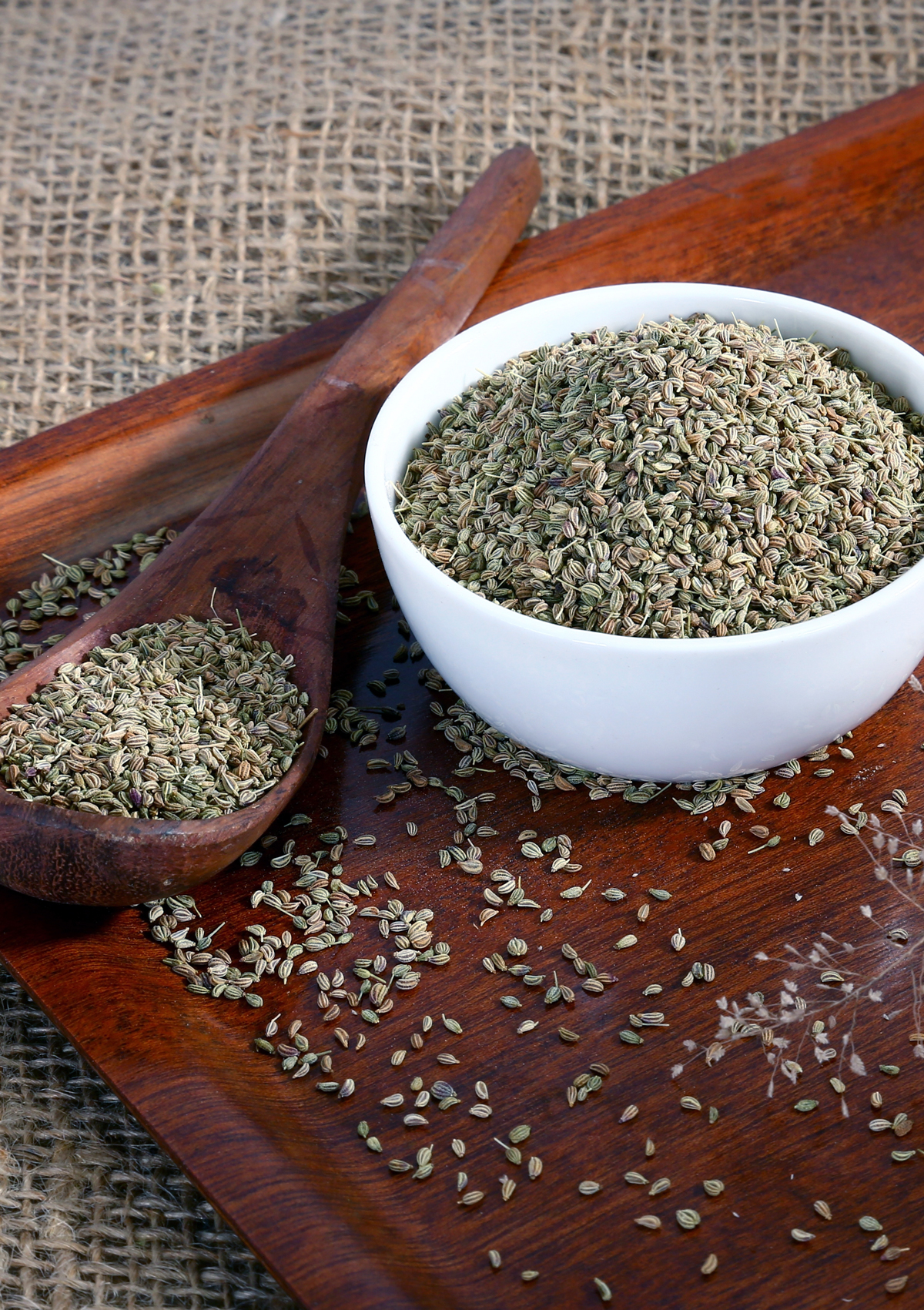 Carom seeds might be tiny, but they sure know how to make an entrance. With their sharp, thyme-like aroma and bold flavor, they’ve been brightening up tadkas and soothing stomachs for generations.
Carom seeds might be tiny, but they sure know how to make an entrance. With their sharp, thyme-like aroma and bold flavor, they’ve been brightening up tadkas and soothing stomachs for generations.
But there’s more to carom seeds than just their punchy taste. From quick fixes in the kitchen to trusted home remedies, this spice quietly does a lot of heavy lifting. Curious how something so small can spice up your food and calm your digestion?
Let’s take a closer look at why carom seeds deserve more than just a forgotten corner in your spice box.
What Are Carom Seeds?
Carom seeds, also known as ajwain, come from a small flowering plant in the parsley family. Though they resemble cumin in appearance, these ridged little seeds carry a completely different flavor. Widely used in Indian, Middle Eastern, and North African cooking, carom seeds have a dual reputation: a culinary powerhouse and a natural home remedy passed down through generations.
Quick Facts About Carom Seeds (Ajwain)
- What it is: Small, oval seeds from the ajwain plant, also called bishop’s weed
- Flavor: Strong, thyme-like, slightly bitter with a pungent aroma
- Best in: Parathas, pakoras, chutneys, lentil dishes, and digestive teas
- Special note: Known for aiding digestion and often used in home remedies
- Storage: Keep in an airtight container, cool and dark; use within 6–12 months for best flavor
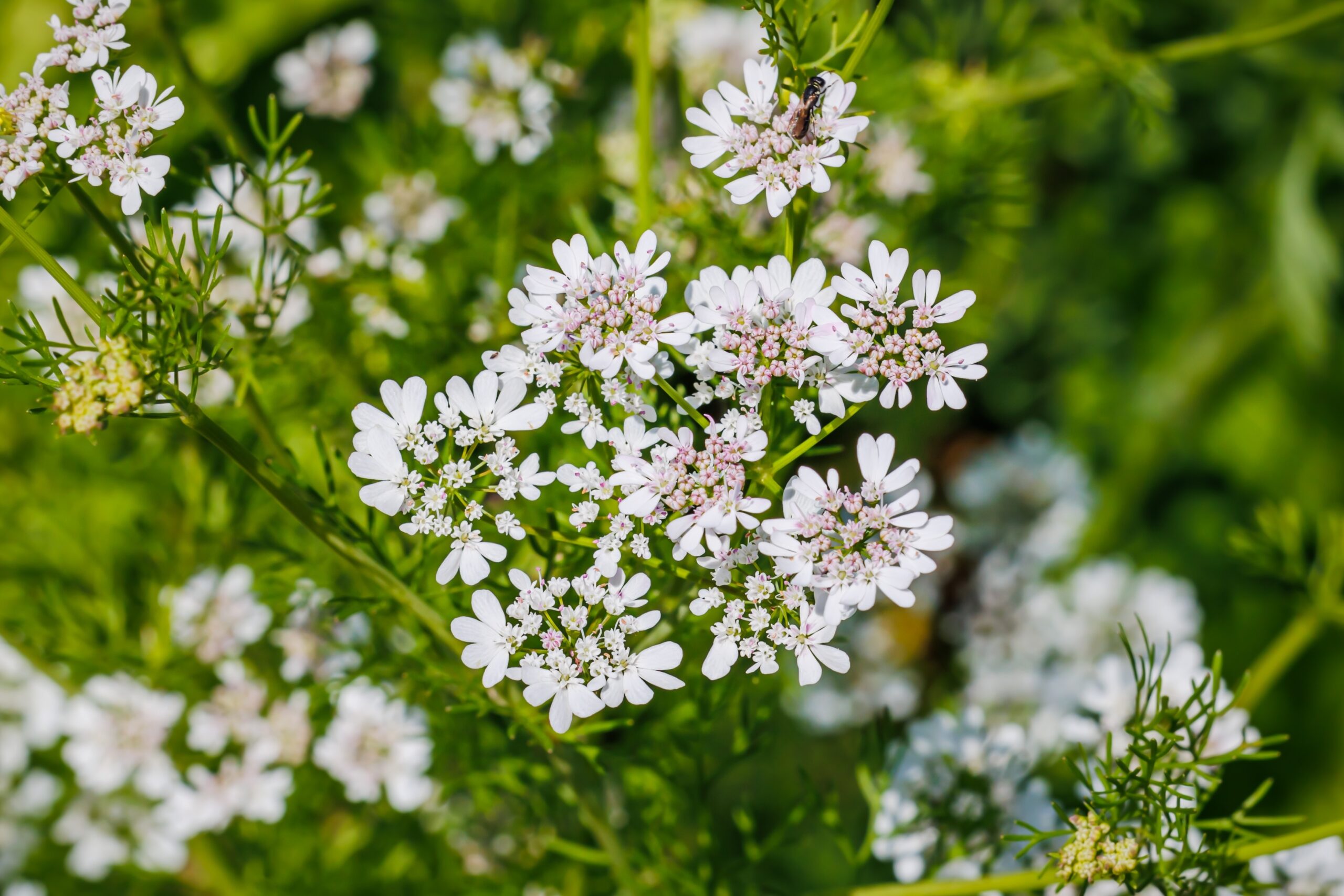
What Carom Seeds Taste and Smell Like
Carom seeds don’t hold back. Their aroma hits you with a sharp, almost medicinal note thanks to their high thymol content — the same compound that gives thyme its punch. The smell is bold, herbal, and instantly recognizable.
On the tongue, carom seeds are just as assertive. Even a small pinch carries a strong flavor: spicy, slightly bitter, and warmly aromatic — like a mix of oregano, anise, and a touch of black pepper. They’re not subtle, and that’s exactly why they stand out both in cooking and in traditional remedies.
Different Forms of Carom Seeds
Carom seeds show up in more than one way, each suited for different uses in the kitchen or beyond:
-
Whole Seeds – The most common form, used in tempering, teas, flatbreads, and savory snacks.
-
Carom Seed Powder – Ground form, handy for spice blends or quick mixing into doughs and batters.
-
Carom Seed Oil – A concentrated extract used in Ayurveda for massage, steam inhalation, or diluted in skin remedies.
-
Carom Extract – Sometimes found in herbal syrups or supplements focused on digestion and respiratory relief.
Culinary Uses Around the World
Carom seeds aren’t limited to one region — their bold taste has traveled across cuisines:
-
India – Essential in parathas, pakoras, lentils, and chutneys, especially dishes that benefit from a digestive boost.
-
Pakistan & Bangladesh – Common in savory snacks, pickles, and spiced teas for aroma and balance.
-
Middle East – Blended into spice mixes or baked into flatbreads for an herby depth.
-
North Africa – Occasionally paired with cumin and coriander in traditional spice blends.
-
Modern Fusion – Showing up in artisanal breads, crackers, flavored oils, and even cookies for a thyme-like twist.

Quick Tips to Get the Best Out of Carom Seeds
Carom seeds don’t like to be shy. To unlock their full flavor, always dry-roast them or sizzle them in hot oil or ghee first. This takes away their raw bitterness and releases that bold, thyme-like aroma.
Whether you’re cooking lentils, kneading dough for parathas, or brewing a soothing tea, here are some easy ways to get the most out of them:
-
Toast before using to mellow sharpness and boost aroma
-
Lightly crush to release more flavor without overpowering
-
Use sparingly — carom seeds are strong, and a little goes a long way
-
Add early in the cooking process so they infuse into the oil or dough
-
Steep in hot water for a simple digestive tea
-
Store in an airtight jar in a cool place to keep their punch
Carom Seeds in Traditional Remedies and Wellness
Beyond flavor, carom seeds have been trusted in home remedies for centuries. Thanks to their high thymol content, they’ve been used in traditional systems like Ayurveda and Unani to support digestion and respiratory health.
-
Digestive Soother – Often chewed after meals or brewed into tea to ease gas, bloating, or indigestion
-
Carom Seed Water (Oma Water) – Made by boiling seeds in water, sipped warm to comfort the stomach; sometimes even given in small amounts to children
-
Respiratory Support – Inhaling steam infused with carom seeds is a folk practice to help ease nasal or chest congestion
-
Menstrual Comfort – Carom seed tea is sometimes used in traditional remedies to help ease cramps, thanks to its warming effect
-
Anti-Microbial Uses – Carom seed oil has been applied in folk traditions for minor skin issues, though evidence here is limited
These practices are deeply rooted in tradition, but they aren’t substitutes for medical care. If you’re curious about using carom seeds for health, it’s always best to check with a healthcare professional.
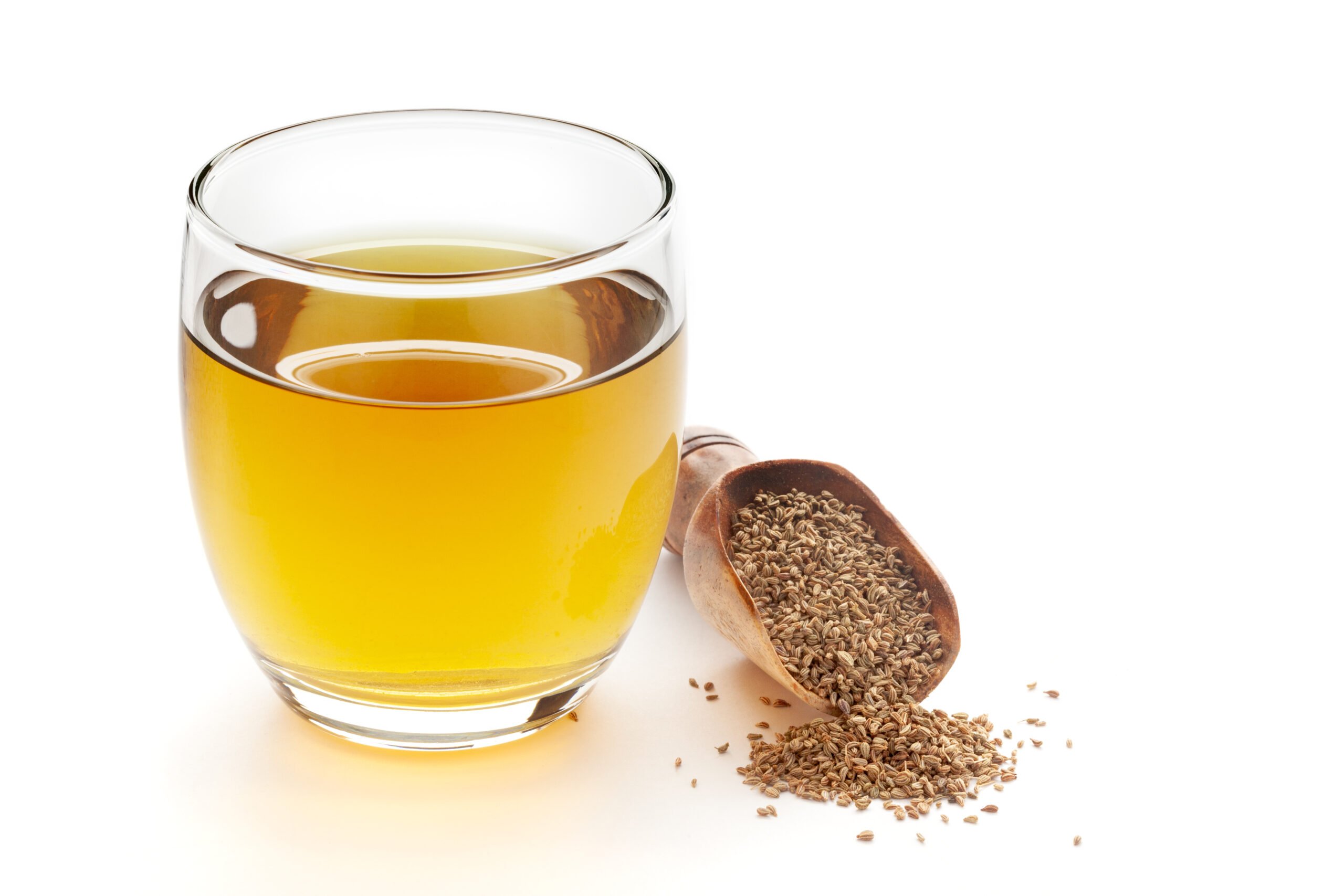
Oma water: a soothing herbal drink made from boiled ajwain seeds for bloating and indigestion
Flavor Pairings
Carom seeds have a bold, slightly bitter flavor with that thyme-like warmth that makes them a perfect match for certain ingredients. Think of them as the spice that lifts earthy or heavy dishes and gives them a sharper edge.
Here’s what carom seeds love to pair with:
-
Potatoes & Root Vegetables – Balances richness with a sharp kick
-
Lentils & Legumes – Cuts through density while helping digestion
-
Onion & Garlic – Adds an extra savory depth in tadkas and spice blends
-
Cumin & Fennel – A natural trio, often seen in digestive spice mixes
-
Wheat & Gram Flour – Works beautifully in parathas, pakoras, and mathri
-
Pickles & Fermented Foods – Stands up to tangy, intense flavors
-
Yogurt & Buttermilk – Just a pinch can transform raitas and chaas
Carom Seed Substitutes
No carom seeds on hand? While their flavor is pretty unique, a few pantry swaps can step in depending on the recipe:
-
Thyme – Closest match in flavor thanks to thymol content
-
Oregano – Earthy and slightly peppery, good for blends and savory dishes
-
Caraway Seeds – Warm and aromatic, though milder; great for breads
-
Cumin + Fennel – Together, they loosely mimic both the aroma and digestive role
-
Celery Seeds – Not identical, but can work in pickles or for a herbal edge
For wellness uses like teas or digestive tonics, fennel or cumin water are the best substitutes — gentler but still soothing.
How to Store Carom Seeds
Carom seeds are rich in volatile oils, which means they can lose their punch quickly if not stored right.
-
Airtight Jar – Locks in aroma and keeps out moisture
-
Cool, Dark Place – Heat and sunlight dull their flavor fast
-
Away from the Stove – Frequent steam exposure makes them go stale
-
Whole, Not Ground – Whole seeds last much longer than powdered
Stored properly, carom seeds stay fresh for up to a year. If they start smelling faint or dusty instead of bold and herbal, it’s time to restock.
Nutritional Value (Per Tablespoon – ~0.2 oz / 6 g)
Carom seeds may be used in tiny pinches, but they pack in surprising nutrients:
- Calories: ~25
- Protein: ~0.04 oz (1 g)
- Fat: ~0.05 oz (1.5 g) (mostly healthy fats)
- Carbohydrates: ~0.1 oz (3 g)
- Fiber: ~0.07 oz (2 g)
- Calcium: ~0.003 oz (80 mg)
- Iron: ~0.00005 oz (1.5 mg)
- Phosphorus & Magnesium: Trace amounts
- Thymol: The key compound behind their aroma and potential benefits
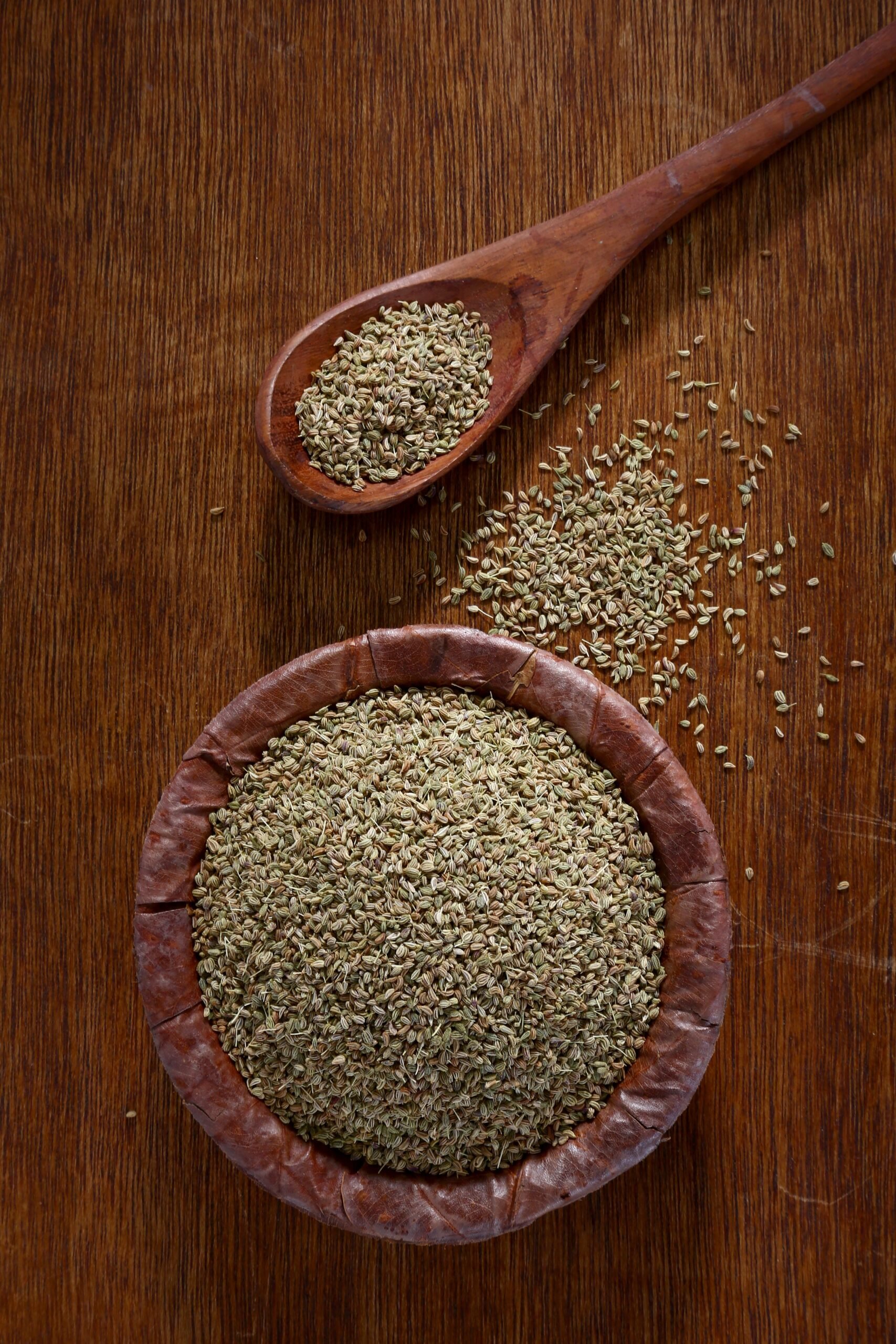
Health Benefits of Carom Seeds
Carom Seeds have been a staple in traditional wellness for generations, and modern research is starting to explore its potential too. While it’s no miracle cure, here are some ways it may support your overall health:
It May Help with Digestion
Carom Seeds is most famously used to ease gas, bloating, and indigestion—thanks to thymol, which may stimulate gastric juices and support smoother digestion (Source).
It May Offer Antimicrobial Properties
Compounds in Ajwain, especially thymol and carvacrol, have shown antimicrobial activity in lab studies, which may help fight certain bacteria and fungi (Source).
It May Help Ease Cough and Cold Symptoms
Carom seeds tea or steam is often used as a home remedy for mild congestion. The essential oils may help loosen mucus and make breathing easier (Source).
It May Help Reduce Inflammation
Animal studies suggest that Carom seeds bioactive compounds may have anti-inflammatory effects, potentially helpful for minor aches and discomfort (Source).
It May Aid in Managing Blood Pressure
Some preliminary research shows Carom seeds extract may help widen blood vessels, which could contribute to lower blood pressure in certain cases (Source).
Potential Health Risks
While Carom seeds are generally safe in small culinary amounts, it’s still a potent spice. Here are a few things to keep in mind, especially if using it for wellness:
It May Cause Heartburn or Irritation
When consumed in excess, its strong oils—especially thymol—can irritate the stomach lining or cause acid reflux in some people (Source).
It May Interact with Certain Medications
Carom seeds may have mild blood-thinning effects, so if you’re on anticoagulants or preparing for surgery, it’s best to check with a healthcare provider first (Source).
Pregnancy Consideration
High doses of carom seeds extract or oil are discouraged during pregnancy, as they may stimulate the uterus. Culinary use is typically fine, but concentrated forms should be avoided unless approved by a doctor (Source).
Topical Use Can Be Irritating
Carom seeds oil may irritate sensitive skin or cause an allergic reaction if applied directly. Always dilute and do a patch test before use (Source).
Final Thoughts
Carom seeds might be tiny, but they sure know how to make a statement—whether they’re lifting the flavor of your favorite snacks or showing up in a cup of soothing digestive tea. With their punchy aroma, bold taste, and long history in traditional wellness, these little seeds have earned a place in both the spice rack and the home remedy kit.
So the next time you spot those ridged little seeds in your kitchen, remember they’re more than just a flavor boost—they might just become your go-to for a happier gut and a tastier meal.
FAQs
Can I eat raw carom seeds?
Yes, you can chew a small pinch of raw carom seeds after meals. Many people do this as a traditional remedy for indigestion or bloating.
How much carom seed is safe to consume daily?
For general culinary or wellness use, ¼ to ½ teaspoon per day is usually safe for most adults. Always consult a doctor if using in larger amounts or for medical purposes.
Can I give carom seeds to children or babies?
Carom seed water is sometimes given in very small amounts to soothe colic or tummy discomfort in babies, but always check with a pediatrician first.
Is it safe to eat carom seeds during pregnancy?
Carom seeds are fine in small amounts as a spice, but concentrated forms like carom seed oil or extract should be avoided unless approved by a healthcare provider.
Do carom seeds help with weight loss?
Carom seed water is often included in home remedies for weight management because it may support digestion and metabolism. However, it’s not a magic solution on its own.
How do I make carom seed tea?
Boil ½ teaspoon of carom seeds in a cup of water for about 5 minutes, strain, and sip warm. You can also add a pinch of salt or a squeeze of lemon if desired.
Are carom seeds and Ajwain the same?
Yes, Ajwain and carom seeds are the same spice—“Ajwain” is the Hindi name, while “carom seeds” is the English name.
Learn More about Carom Seeds
Wikipedia — Ajwain
This article is exploring Ajwain (carom seeds), covering its botanical background, cultivation, culinary and medicinal uses, and key compounds like thymol that may offer digestive and antimicrobial benefits.
Healthline — 6 Emerging Benefits and Uses of Carom Seeds (Ajwain)
This engaging article highlighting the importance of Carom seeds - sharing its botanical profile, culinary and traditional uses, and enlisting research-backed potential benefits like digestive support, respiratory relief, and blood pressure regulation while noting safety precautions.



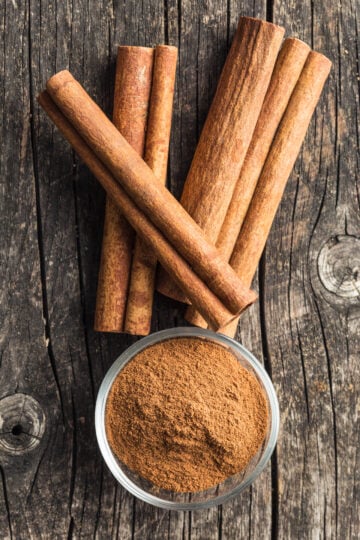
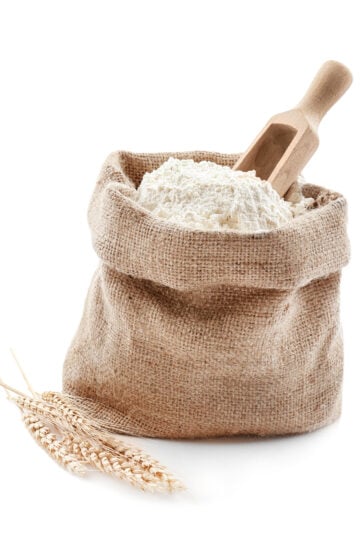
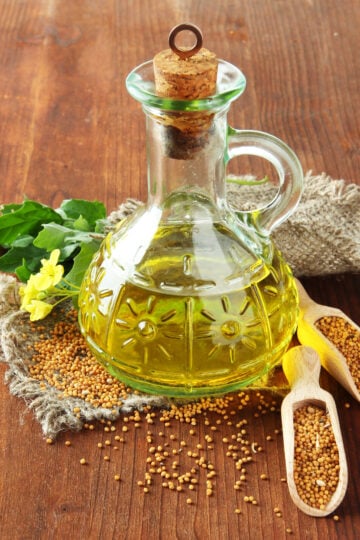
Have a question or something to share? Leave a comment below!